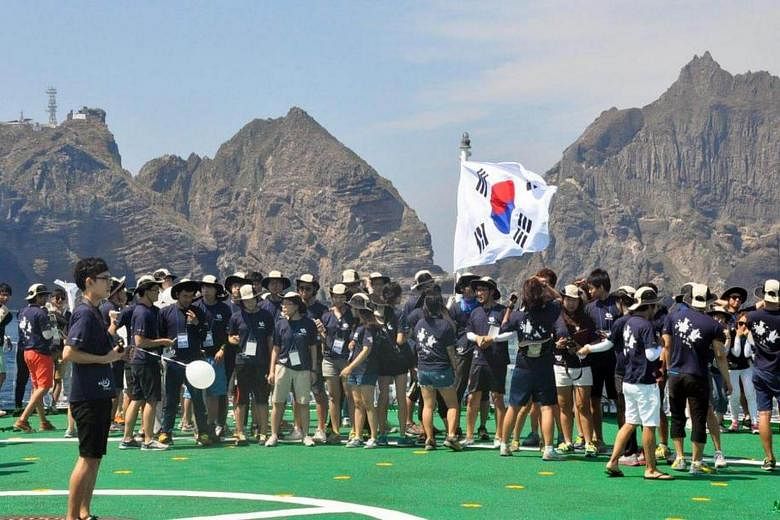SEOUL (AFP) - South Korean President Park Geun Hye on Monday (Aug 15) called for a "future-oriented" relationship with Japan, even as a group of Seoul lawmakers dredged up a long-running territorial dispute by visiting some islets claimed by Tokyo.
The visit by 10 MPs to the South Korean-controlled Dokdo islets in the East Sea (Sea of Japan) drew an angry response from the Japanese government which called the trip "extremely regrettable." The row over the islets - which are called Takeshima in Japanese - is one of a number of bitter disputes that have tainted relations between Seoul and Tokyo for decades.
But both countries managed to turn a major corner last December when they reached a "final and irreversible" agreement on one of the most emotive issues - the so-called "comfort women" forced to work in Japanese wartime brothels.
In a speech to mark the 71st anniversary of the end of Japanese colonial rule over the Korean peninsula, Park stressed the need to look forward.
"We should newly define relations with Japan to forge future-oriented ties," Park said in her televised address.
Her remarks coincided with the lawmakers' visit to Dokdo where they met South Korean security personnel based on the islets.
A surprise trip to Dokdo in 2012 by then-South Korean president Lee Myung Bak had triggered a spike in tensions with Japan, and Monday's visit was also sharply criticised by Tokyo.
"We absolutely cannot accept this," said Japan's chief cabinet secretary Yoshihide Suga.
"It is extremely regrettable that they went ahead with the visit despite our protest beforehand and calls for cancellation of the visit," Suga said.
But one of the South Korean lawmakers, Na Kyung Won, said Tokyo's anger was misplaced.
"This is part of our job ... visiting our territory, and Japan's overreaction is incomprehensible," Na said.
The August 15 anniversary of Japan's defeat in World War II was also marked in Tokyo, where Prime Minister Shinzo Abe sent a ritual donation to a controversial Tokyo war shrine.
The Yasukuni Shrine honours millions of mostly Japanese war dead, including some senior military and political figures convicted of war crimes.
In an apparent nod to China and South Korea - who see the shrine as a symbol of Japanese colonial abuses - Abe avoided making a personal visit.
However, several senior officials, including the defence minister and deputy chief cabinet secretary, did pay their respects in person - a step the South Korean foreign ministry called "deeply regrettable."

